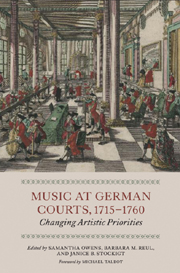Book contents
- Frontmatter
- Contents
- List of Tables
- Foreword
- Preface
- Editorial Notes
- Notes on Contributors
- List of Abbreviations
- 1 ‘Das gantze Corpus derer musicirenden Personen’: An Introduction to German Hofkapellen
- KINGDOMS AND ELECTORATES
- DUCHIES
- PRINCIPALITIES AND PRINCE-BISHOPRICS
- 9 The Court of Anhalt-Zerbst
- 10 The Court of Sondershausen
- 11 The Court of Würzburg
- LANDGRAVIATES AND MARGRAVIATES
- Index
9 - The Court of Anhalt-Zerbst
from PRINCIPALITIES AND PRINCE-BISHOPRICS
Published online by Cambridge University Press: 12 September 2012
- Frontmatter
- Contents
- List of Tables
- Foreword
- Preface
- Editorial Notes
- Notes on Contributors
- List of Abbreviations
- 1 ‘Das gantze Corpus derer musicirenden Personen’: An Introduction to German Hofkapellen
- KINGDOMS AND ELECTORATES
- DUCHIES
- PRINCIPALITIES AND PRINCE-BISHOPRICS
- 9 The Court of Anhalt-Zerbst
- 10 The Court of Sondershausen
- 11 The Court of Würzburg
- LANDGRAVIATES AND MARGRAVIATES
- Index
Summary
ANHALT-ZERBST, a principality situated about 90 km north-west of Leipzig, is best known as the childhood home of Catherine the Great of Russia (1729–1796) and the workplace of its long-time Hofkapellmeister Johann Friedrich Fasch (1688–1758). This chapter presents a systematic re-evaluation of the expansion of the Anhalt-Zerbst Kapelle between 1715 and 1760. It will draw heavily from extant account books (‘Kammerrechnungen’), intact for the period 1662 to 1790, and numerous other hitherto unknown primary sources held at Dessau and Zerbst/Anhalt. First to acknowledge publicly the importance of Hofmusik was Prince Carl Wilhelm (b. 1652, r. 1676–1718) in 1699. His son, Johann August (b. 1677, r. 1718–42), possessed an even greater interest in the arts and during his reign provided the long-term financial support for a well-appointed Hofkapelle and an entrepreneurial Kapellmeister to flourish. Catherine's father, Prince Christian August (1690–1747), and his cousin Johann Ludwig (1688–1746) followed in Johann August's footsteps in this respect, especially after Catherine (formerly Princess Sophie Auguste Friedericke of Anhalt-Zerbst) married the future tsar of Russia in 1745. A clear shift in priorities occurred after their deaths, when Catherine the Great's mother, Dowager Princess Johanna Elisabeth (1712–1760) began to rule in 1747 on behalf of her younger child, Friedrich August (b. 1734, r. 1752–93). But it was the Seven Years' War (1756–63) that marked the beginning of the end in terms of a musical Blütezeit at the court.
- Type
- Chapter
- Information
- Music at German Courts, 1715–1760Changing Artistic Priorities, pp. 259 - 286Publisher: Boydell & BrewerPrint publication year: 2011



